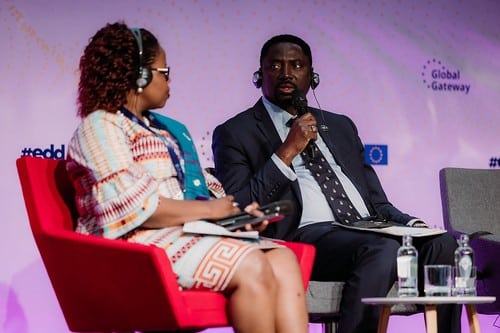''The world needs a positive investment impulse, and it needs it now,'' Ursula von der Leyen said in her speech at the opening ceremony From the European Development Days (EDD). With the new 'Global Gateway strategy', billions will be invested in sustainable and inclusive infrastructure to trigger further development worldwide.
This strategy was the focus of the two-day event, organised by the European Commission, which took place on Tuesday 21 June and Wednesday 22 June. The idea behind the annual EDD is to bring together the development community to exchange ideas and experiences to come up with new valuable solutions and collaborations.
The Global Gateway strategy
The Global gateway is designed to build resilient connections between Europe and the rest of the world. It invests hundreds of billions in high-quality infrastructure; it should ensure "sustainable, high-quality projects that take into account the needs of partner countries and deliver lasting benefits for local communities".
With this strategy as the overarching theme, several interesting lectures, panels and brainstorming sessions were organised over two days, often focusing on connections with and within Africa. FMS also attended several of these sessions.
The Senegambia bridge as an example of African cooperation
During one of the first panels, 'Sustainable and smart corridors', the focus was on the African continent's infrastructure. For Africa to be at its best in the world, more efficient transport networks are needed. Ports in Africa are regularly inefficiently set up, making it difficult to import and export goods. Flying within Africa can, in very many cases, only be done via European destinations. This often makes it even easier for an African country to do business with countries in other continents, such as China, than with another African country. Such problems limit the position and development of many countries in Africa.
Yet progress is also being made in this regard. Increasingly, collaborations between neighbouring countries are taking place in building roads. The Gambia's foreign minister, Mamadou Tangara, talks about the Senegambia Bridge. Across the narrow Gambia, completely surrounded by Senegal, a highway bridge has been built to connect Senegal's northern and southern provinces. According to the minister, such projects show that efficient infrastructure through collaborations within Africa is quite possible.
The Great Green Wall
One of the other large panels continued on the value of such collaborations. In the session 'Regreening Africa and the Great Green Wall' was explained that a huge movement has been set up in Africa to establish 8,000 km of vegetation along the length of the continent.
Crucial to the success of this movement are partnerships with local communities and organisations. Only by connecting with them can these ambitions be realised. Mieke Bourne, programme manager of Regreening Africa, stressed the importance of providing incentives to local partners to make greening sustainable.
Local communities are the core
This message also emerged in the closing ceremony. To make the Global Gateway a success, youth must be involved in the discussion, genuine collaborations must be established and local governments must be empowered. But above all, it is important that the interests and needs of local communities are reflected in the core of the strategy.
Only in this way can it truly lead to inclusive development, was the conclusion of the EDD 2022.
Several sessions of EDD 2022 can be viewed via the EDD website.
Image: Minister of Foreign Affairs Gambia Mamadou Tangara speaking during the session 'Sustainable and smart corridors'





